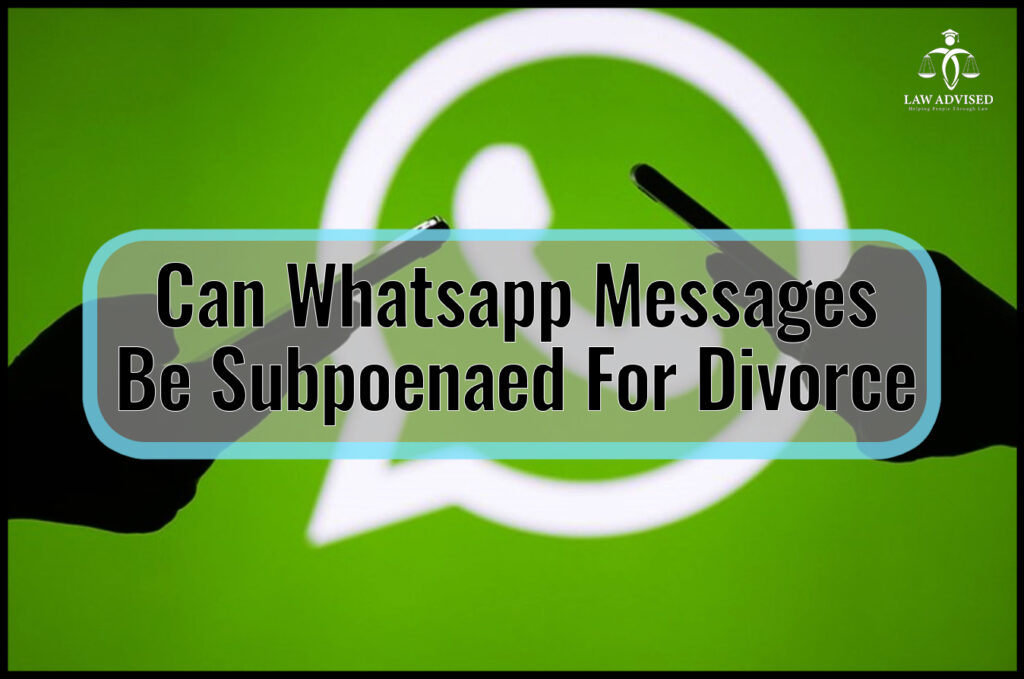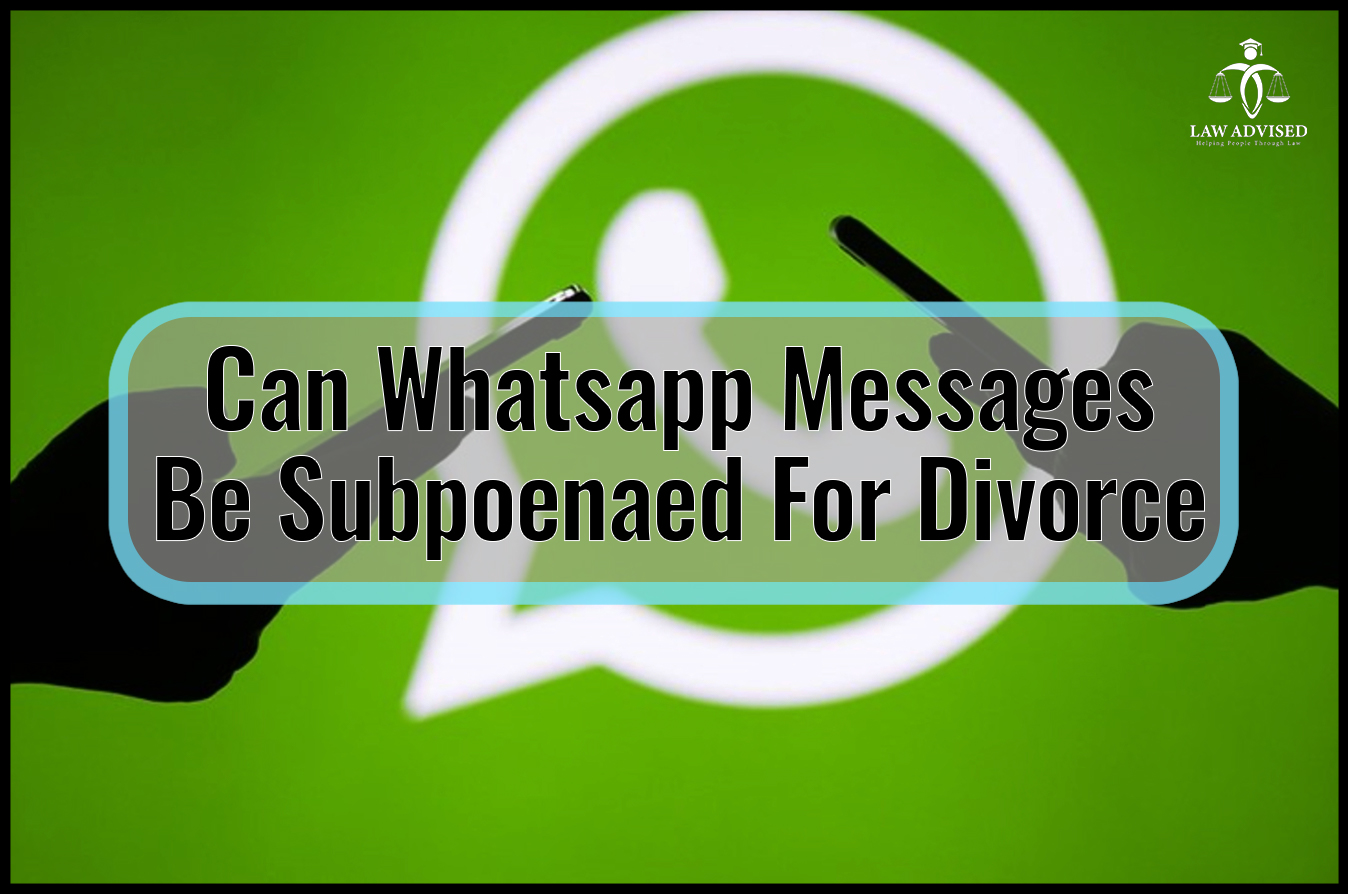Yes, WhatsApp messages can be subpoenaed for divorce proceedings. In divorce cases, evidence from digital platforms, such as WhatsApp, can play a crucial role.
As technology continues to advance, messages exchanged via WhatsApp are increasingly being used as evidence to support or challenge claims in divorce cases. These messages can provide insights into communication patterns, agreements, or even evidence of infidelity. However, it is important to note that obtaining WhatsApp messages for legal purposes typically requires a subpoena or court order.
Once obtained, these messages can be used to support various aspects of a divorce case, including child custody disputes, division of assets, or allegations of misconduct. Therefore, it is crucial for those going through a divorce to be aware of how their digital communications could potentially be used in legal proceedings.
The Legal Implications Of Subpoenaing Whatsapp Messages
Understanding the legality of obtaining Whatsapp messages in divorce cases
As technology becomes increasingly integrated into our lives, the use of digital communication platforms like WhatsApp has raised interesting legal questions, particularly in divorce cases. Can Whatsapp messages be subpoenaed as evidence? The answer is yes, but certain conditions must be met.
When it comes to using Whatsapp messages as evidence in divorce cases, it is important to understand that individuals have a reasonable expectation of privacy in their communications. However, this expectation may be weakened if WhatsApp messages are shared with third parties.
To obtain WhatsApp messages as evidence in a divorce case, a subpoena must be issued by a court. The subpoena must clearly state the specific messages or information sought and the relevance to the case. Additionally, the party seeking the Whatsapp messages must demonstrate that the messages are authentic and have not been tampered with.
It is worth noting that obtaining WhatsApp messages may require the cooperation of the messaging service provider, which may have its policies and procedures for disclosing user data. Additionally, the admissibility of Whatsapp messages as evidence may be subject to the rules of evidence in the relevant jurisdiction.
In conclusion, while WhatsApp messages can be subpoenaed for divorce cases, it is important to navigate the legal landscape carefully. The process of obtaining and using Whatsapp messages as evidence should be approached with caution, ensuring compliance with legal requirements and the protection of privacy rights.
The Process Of Subpoenaing Whatsapp Messages For Divorce
Subpoenaing Whatsapp messages can be a crucial step in divorce cases to gather evidence and establish facts. Follow this step-by-step guide to understand the process:
- Consult with your divorce attorney to determine the relevance of WhatsApp messages in your case.
- File a motion or request with the court to issue a subpoena for Whatsapp messages.
- Provide specific details about the messages you are seeking, such as sender, recipient, date, and time.
- Serve the subpoena on the relevant parties, including WhatsApp as the custodian of the messages.
- Wait for WhatsApp to respond or provide the requested messages.
- Review the obtained messages and analyze their relevance to your divorce case.
- Share the obtained messages with your attorney and strategize the best way to present them in court.
Through a subpoena for Whatsapp messages, you can obtain information such as text conversations, voice messages, images, and timestamps. These messages can offer valuable evidence concerning communication, behavior, or any relevant matter affecting your divorce case.
The Challenges Of Subpoenaing Whatsapp Messages For Divorce
The limitations and difficulties in obtaining Whatsapp messages as evidence:
When trying to obtain WhatsApp messages as evidence in a divorce case, there are several legal considerations and potential roadblocks to be aware of. Firstly, privacy laws may protect the confidentiality of WhatsApp messages, making it challenging to obtain them without proper legal authority. Secondly, data encryption on WhatsApp means that messages are sent in an encrypted format, making it difficult to access their content even with a subpoena. Additionally, limited storage capacity on devices may result in WhatsApp messages being automatically deleted after a certain period, making it challenging to retrieve older messages.
Furthermore, jurisdictional issues may arise if the servers hosting WhatsApp data are located in a different country. This could delay or complicate the process of obtaining the messages as evidence in a divorce proceeding. Overall, while WhatsApp messages can be valuable evidence, it is important to consider these limitations and difficulties when subpoenaing them for use in a divorce case.
The Privacy Concerns Of Whatsapp Messages In Divorce Proceedings
The privacy concerns surrounding Whatsapp messages in divorce proceedings revolve around the application of the right to privacy. It is crucial to examine the extent to which privacy is protected in these cases.
When it comes to Whatsapp messages in divorce proceedings, the right to privacy presents various considerations. While individuals have a reasonable expectation of privacy in their communications, this expectation may be challenged in legal proceedings. Courts may subpoena Whatsapp messages as evidence if they are deemed relevant to the case.
It is important to note that the extent to which privacy is protected can vary depending on jurisdiction and the specific circumstances of the case. However, it is generally recognized that the right to privacy should be balanced with the need for disclosure in divorce proceedings.
In conclusion, the privacy concerns of Whatsapp messages in divorce proceedings highlight the delicate balance between individual privacy rights and the legal requirements of a divorce case. Individuals need to be aware of their rights and the potential implications of their digital communications in such legal proceedings.
The Admissibility Of Whatsapp Messages As Evidence In Divorce Cases
When it comes to divorce cases, the admissibility of WhatsApp messages as evidence can be a crucial factor. However, it is important to understand the rules of evidence and how they apply to such messages in divorce proceedings.
One of the key factors affecting the admissibility of WhatsApp messages is authenticity. Courts generally require evidence to be authentic, meaning that it must be proven that the messages are indeed from the party they are attributed to. This can be challenging with electronic messages like WhatsApp, as they can be easily manipulated or forged.
Another factor to consider is the relevancy of the WhatsApp messages to the divorce case. The messages must be directly related to the issues at hand, such as infidelity, financial matters, or child custody. Irrelevant messages may not be admissible as evidence.
Privacy concerns also come into play. While WhatsApp messages can provide valuable evidence, parties involved in a divorce may have a reasonable expectation of privacy in their communications. Courts need to balance the need for evidence with the right to privacy.
In conclusion, the admissibility of WhatsApp messages as evidence in divorce cases is a complex issue that depends on factors such as authenticity, relevancy, and privacy. It is crucial to consult with a legal professional to understand how these factors apply in your specific case.
The Importance Of Digital Forensic Experts In Retrieving Whatsapp Messages
When it comes to divorce cases, digital evidence plays a crucial role in determining the truth and obtaining a fair outcome. Particularly, retrieving and authenticating Whatsapp messages have become increasingly essential in recent years. Digital forensic experts possess the necessary skills and expertise to meticulously extract and analyze data from mobile devices, including Whatsapp chats. These professionals follow a systematic process of data acquisition, ensuring the preservation of evidence in a forensically sound manner.
By utilizing advanced techniques and specialized tools, digital forensic experts can retrieve deleted or hidden WhatsApp messages, which might have a significant impact on divorce proceedings. They employ various methods, such as logical and physical extractions, to retrieve both current and deleted messages. Furthermore, these experts are adept at validating the authenticity of the obtained information, ensuring its admissibility in court.
The value of professional expertise in obtaining accurate and reliable WhatsApp message evidence cannot be overstated. Their meticulous approach safeguards against tampering, ensuring the integrity of the evidence. Whether it involves infidelity, financial matters, or communication issues, digital forensic experts play a crucial role in uncovering the truth and providing the necessary evidence for divorce cases.
The Process Of Collecting And Presenting Whatsapp Messages In Divorce
When it comes to collecting and presenting Whatsapp messages in divorce proceedings, there are best practices that can be followed. First and foremost, it is important to understand the process of collecting and preserving these messages as evidence. One way to do this is by taking screenshots of the conversations and making sure to capture the date and time stamps. It is also advisable to back up these messages to a secure and reliable location, such as a cloud storage service.
Furthermore, it is important to ensure the authenticity of the messages by providing context and supporting evidence, if necessary. Presenting the Whatsapp messages effectively in divorce proceedings can be done by organizing them clearly and chronologically, and providing relevant explanations or interpretations. By following these best practices, Whatsapp messages can be valuable evidence in a divorce case.
Frequently Asked Questions Of Can Whatsapp Messages Be Subpoenaed For Divorce

Can Whatsapp Messages Be Used As Evidence In A Divorce?
Yes, WhatsApp messages can be used as evidence in a divorce. Courts have recognized digital messages as admissible evidence.
How Can WhatsApp Messages Be Subpoenaed For Divorce?
To subpoena Whatsapp messages for divorce proceedings, you will need to consult with your attorney and follow the legal process in your jurisdiction.
Can Deleted WhatsApp Messages Be Retrieved For Divorce?
Retrieving deleted Whatsapp messages for divorce depends on various factors, such as device type and backup settings. Expert forensic analysis may be required.
Are Whatsapp Voice Calls Admissible In A Divorce Case?
Yes, Whatsapp voice calls can be admissible in a divorce case as evidence, provided they are properly obtained and authenticated.
What Criteria Should Be Met To Admit WhatsApp Messages In Court?
To admit Whatsapp messages in court, the messages must be deemed relevant, authentic, and obtained legally, meeting the criteria of admissible evidence.
Can Whatsapp Messages Be Used To Prove Infidelity In Divorce?
Yes, WhatsApp messages can be used to prove infidelity in a divorce, as they provide a digital record of communications that may be pertinent.
What Steps Should I Take To Preserve WhatsApp Messages For Divorce?
To preserve Whatsapp messages for divorce, it’s best to consult with your attorney, who can advise you on the proper legal steps for preservation.
How Can I Obtain WhatsApp Messages For My Divorce Case?
Obtaining WhatsApp messages for a divorce case may require legal procedures, such as obtaining a subpoena or court order. Consult with your attorney for guidance.
Conclusion
The process of subpoenaing WhatsApp messages for divorce proceedings can play a vital role in gathering evidence and determining the truth. However, it is crucial to consult with legal professionals who can navigate the complexities of obtaining and presenting digital evidence.
As technology continues to evolve, it is essential to stay informed about the changing landscape of divorce proceedings and the potential impact of messaging apps like WhatsApp.
Ismail Hossain is the founder of Law Advised. He is an Divorce, Separation, marriage lawyer. Follow him.





Leave a Reply